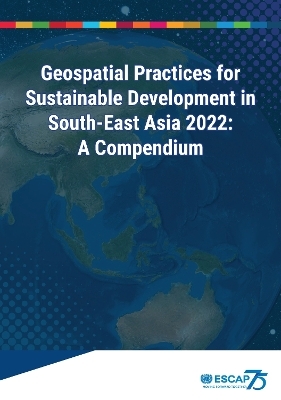
Geospatial practices for sustainable development in South-East Asia 2022
a compendium
Seiten
2022
United Nations (Verlag)
978-92-1-120848-1 (ISBN)
United Nations (Verlag)
978-92-1-120848-1 (ISBN)
Provides information to countries in the development and management of their geospatial information resources, to integrate new and innovative approaches for evidence-based decision-making, highlighting relevant country situations and circumstances.
Geospatial information has been providing far-reaching solutions to pressing issues facing humanity, ranging from health, education, food security, agriculture, to disaster risk reduction and resilience-building. The effective integration of geospatial data, existing statistics and ground-based information and exploiting new data sources, analytics, and tools has proven instrumental to deliver timely information necessary for governments, businesses, communities and citizens to make evidenced-based decisions. However, despite advances in the availability and quality of geospatial information, several gaps and challenges remain on the effective use of geospatial information. To address this, this publication aims to provide information to countries in the development and management of their geospatial information resources, to integrate new and innovative approaches for evidence-based decision-making, highlighting relevant country situations and circumstances. The Compendium is the second in a series of ESCAP publications to assess progress implementing the Asia-Pacific Plan of Action on Space Applications for Sustainable Development (2018- 2030) and will explore country level geospatial practices for sustainable development in South-East Asia, reflecting sub regional specificities
Geospatial information has been providing far-reaching solutions to pressing issues facing humanity, ranging from health, education, food security, agriculture, to disaster risk reduction and resilience-building. The effective integration of geospatial data, existing statistics and ground-based information and exploiting new data sources, analytics, and tools has proven instrumental to deliver timely information necessary for governments, businesses, communities and citizens to make evidenced-based decisions. However, despite advances in the availability and quality of geospatial information, several gaps and challenges remain on the effective use of geospatial information. To address this, this publication aims to provide information to countries in the development and management of their geospatial information resources, to integrate new and innovative approaches for evidence-based decision-making, highlighting relevant country situations and circumstances. The Compendium is the second in a series of ESCAP publications to assess progress implementing the Asia-Pacific Plan of Action on Space Applications for Sustainable Development (2018- 2030) and will explore country level geospatial practices for sustainable development in South-East Asia, reflecting sub regional specificities
| Erscheinungsdatum | 02.03.2023 |
|---|---|
| Zusatzinfo | col. ill., col. figs, tables |
| Verlagsort | New York |
| Sprache | englisch |
| Themenwelt | Sozialwissenschaften ► Politik / Verwaltung ► Europäische / Internationale Politik |
| Sozialwissenschaften ► Soziologie ► Empirische Sozialforschung | |
| Wirtschaft ► Volkswirtschaftslehre ► Makroökonomie | |
| ISBN-10 | 92-1-120848-3 / 9211208483 |
| ISBN-13 | 978-92-1-120848-1 / 9789211208481 |
| Zustand | Neuware |
| Haben Sie eine Frage zum Produkt? |
Mehr entdecken
aus dem Bereich
aus dem Bereich
erfolgreiche Interessenvertretung durch Prozesskompetenz im komplexen …
Buch | Hardcover (2023)
Wiley-VCH (Verlag)
CHF 58,75
Studienbuch
Buch | Hardcover (2023)
De Gruyter Oldenbourg (Verlag)
CHF 62,90


